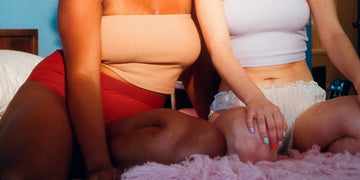Does birth control treat acne?

Over the past year my TikTok feed has been flooded by videos of teenage girls applying Drunk Elephant skincare products in an attempt to heal irritated, acne prone skin. We might think of this trendy skincare as extravagant, the effort of pubescent and post-pubescent girls and women to find a solution to vexing hormonal or “period” acne isn’t anything new.
It might be Drunk Elephant for the teens of today, but I slathered Mario Badescu pink drying lotion onto my face for years after watching my favorite youtubers do the same. Generation after generation has struggled with acne (and not just teens, but adults, too) and tried every treatment they can buy, hoping for clear skin. But, topical treatments are a bandaid on the bullet hole of hormonal acne. One popular treatment for this kind of acne is birth control pills, or oral contraception.
I was put on birth control when I was around fifteen for a laundry-list of issues to hopefully cure – migraines, endometriosis complications, and, of course, acne. My acne has gone away since going on the pill, but I can’t exactly attribute it to birth control. This isn’t to say the pill doesn’t help with acne, but instead to say that you shouldn’t just talk to your doctor about this, but a dermatologist too. Here’s all the information I wish I knew about birth control’s relationship to acne – before I got on it.
How does birth control impact acne?
First, let’s go over why birth control affects acne. When androgens (aka hormones) are released in the body, the production of sebum (or skin oil) occurs. When androgens increase, sebum can increase. This may cause clogged pores, resulting in acne. This is what is known as hormonal acne, or acne that corresponds with the hormonal cycle. When birth control pills containing both estrogen and progesterone are taken, androgen levels are lowered, in turn lowering sebum levels too. Birth control pills that only contain progesterone, on the other hand, may worsen acne.
What kinds of birth control help acne?
Not all birth control methods are created equal in the world of acne treatment. To reiterate, pills that contain a combination of estrogen and progesterone, known as combo pills, are helpful in reducing skin oil. These are the types of pills that have three weeks in one color, and one week with another color (placebo pills). Unlike other birth control pills, they don’t have “tri” in the name. Three types of these pills are currently approved by the FDA for treating acne – Estrostep, YAZ, and Beyaz.
How does birth control impact acne?
Like any medical decision, birth control as an acne treatment method isn’t one-size-fits-all – there are pros and cons that come with its use. Birth control is particularly helpful for acne that occurs along the jaw, lower face, or neckline, often cystic acne. If you’ve tried a variety of products, prescription treatments, and lifestyle changes without results, birth control can be a good next step in your acne treatment journey. And if you’re already looking for a contraception method, birth control’s potential acne-relieving effects are an added bonus. With that being said, birth control as an acne treatment isn’t universal. It can take months on the pill for acne to lessen, and may initially cause acne flare-ups. Lastly, taking the birth control pill – whether for acne or for safe sex purposes – isn’t the best fit for everyone (for more on choosing a contraceptive method that’s right for you, check out this article).
Although birth control pills might not have been the cure for my acne, that doesn’t diminish the success others have found in taking it. Be sure to talk to both your general practitioner and a dermatologist to consider the birth control pill as the next step in your acne journey.
Keep Reading

Menstrual cups- everything you need to know
Dec 5

Answers to all of your O-Pill questions
Sep 12

20 ways to ask for consent
Oct 3








